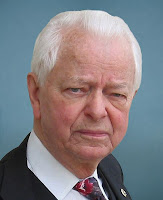This blog ordinarily is focused on business, economics, and related social issues –but a pause is in order to recognize Senator Robert C. Byrd of West Virginia, who passed away early today. Byrd is probably the last of his kind, and a direct link can be drawn between Byrd another gentleman of the South, Senator William Fulbright (D-Ark.), with whom Byrd bore many similarities.
In their salad days, both were segregationists. Byrd, of course, was a member of the Ku Klux Klan. Both senators, in their own ways, repented. (Byrd became a sponsor of legislation that saluted Martin Luther King.) Both had lengthy Senate careers – in fact, were institutions, seemingly invulnerable to the whims of a fickle electorate. And both became unwavering opponents of military adventurism and American imperial arrogance. Fulbright opposed the idiocy and facile cold-war analogies of Vietnam, along with the certainties of his fellow southerners, Lyndon Johnson and Secretary of State Dean Rusk—and Fulbright wrote a classic indictment of U.S. overreach, The Arrogance of Power. Byrd, in turn, spoke out –in fact, he railed – against the moronic military aggression directed toward Iraq by another southerner (or, at least, professed southerner) George W. Bush. “The image of America has changed,” he said in challenging the U.S. invasion. “Around the globe, our friends mistrust us, our word is disputed, our intentions are questioned.”
We live with the unhappy legacy of Bush’s folly –and Byrd’s fellow senators’ cowardice and kowtowing to the will of the bullying Bush Administration. Byrd’s opposition to U.S. imperialism was rooted in the sense that he could overcome every electoral challenge, so in that way he was a throwback to less democratic times. But Americans still face a maddening conundrum: Which is better—democratically endorsed imperial overreach or challenges from those who have enjoyed elite privileges? In the era of the likes of Scott Brown and Ron Paul, we no longer have to make that choice.


